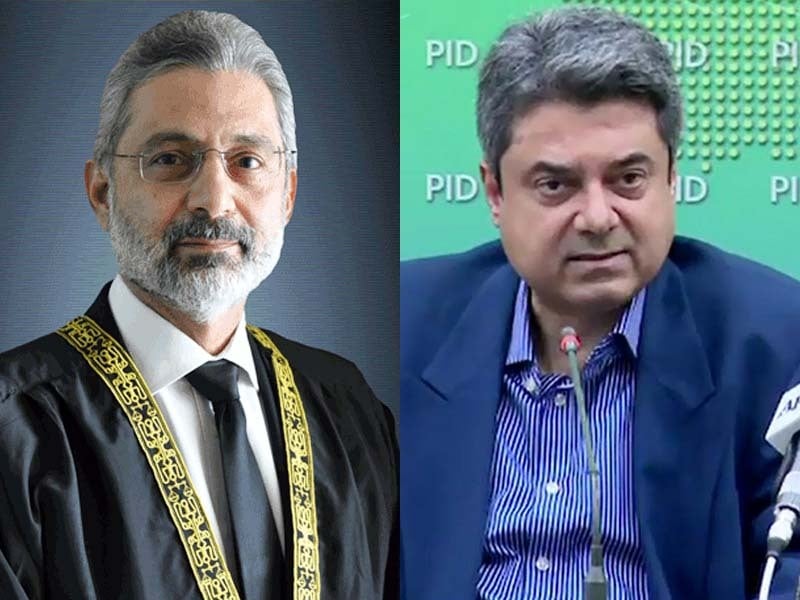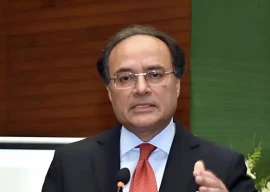
"This Hon’ble Court may be graciously pleased not to permit private counsel to represent official respondents and not to permit Mr Farogh Naseem, who was law minister till 1 June 2020, to represent anyone (other than himself) as counsel," said a six-page application.
Justice Qazi Faiz Isa, an apex court judge in line to become the future chief justice of Pakistan, submitted the application to the SC full-court, led by Justice Umar Ata Bandial, that will resume hearing of the case today (Tuesday).
The application said the conduct of Farogh Naseem amounted to solicitation, which is specifically prohibited by Rule 135 of the ‘Canons of Professional Conduct and Etiquette of Advocates’ enacted pursuant to the Pakistan Legal Practitioners and Bar Councils Rules, 1976.
"One is further constrained to point out that his conduct also comes within the definition of ‘tout’ mentioned in section 2(m) the Legal Practitioners and Bar Councils Act, 1973, which also describes, a tout as one ‘who procures…to any person interested in any legal business to procure’.”
According to the application, there has been double procurement in the case. “Mr Farogh Naseem, the law minister, procured this case for the advocate, Mr Farogh Naseem.”
It said Naseem is arrayed as a respondent in this petition and as such he can appear in person to represent himself. When he was appointed as law minister his practice by reason of his appointment to any office of profit under the government stood suspended under Order VI, Rule 29 of SC Rules 1980.
“The said suspension has not as yet been withdrawn. Moreover, such suspension cannot be withdrawn when the person specifically states he will be returning to the said office of profit under government.”
SC judge said if Farogh Naseem represents the government or anyone else in this case it would constitute ‘illegal practice’ in terms of section 58 the Legal Practitioners and Bar Councils Act, 1973.
“‘Illegal practice’ is a criminal offence the prescribed punishment for which is, imprisonment for a term which may extend to three years, or with fine up to fifty thousand rupees, or with both.
"Farogh Naseem after having held public office cannot accept engagement in connection with any matter which he has investigated or dealt with while in such office’ as stipulated in Rule 174 of the Pakistan Legal Practitioners and Bar Councils Rules, 1976," he said.
He also objected to Naseem’s conduct, which, he said, till his resignation on June 1, was most unbecoming of the office of the law minister. He betrayed the Constitution and the law of Pakistan and his conduct is also deceptive.
The application said the case was last listed on February 24 when it was adjourned on behalf of the contesting respondents to March 30.
“This court had stated that, ‘no further adjournment shall be sought by the federation’. However, due to the prevalence of the Covid-19 virus pandemic it was de-listed”.
He said if the government wanted to engage a private counsel – which is not permissible but for the sake of argument alone – why was Naseem not engaged months earlier, when the former Attorney-General for Pakistan (AGP) Anwar Mansoor Khan resigned and his replacement was not prepared to defend the government in this case.
He asked why Naseem resigned just one day before the hearing of the case.
“There are two obvious reasons for this. Firstly, Farogh Naseem wanted to enjoy the benefits and privileges of his office till the proverbial eleventh hour.
“Secondly, the contesting respondents wanted to spring a complete surprise on the petitioner and his counsel so he/they would not have time to submit objections, let alone to do so properly."
He said Shahzad Akbar – a respondent – engaged Farogh Naseem to represent him on June 1, the very day Naseem tendered his resignation. Naseem also engaged Irfan Qadir to represent him the same day.
“In perfect coordination, Mr Zial Ul Mustafa Nasim (respondent No. 9) also the same day engaged Sheryar Swati. Since these respondents are official respondents it needs to be disclosed how much the government is paying for the services of counsel,” he said.
The petitioner judge said official respondents have also violated the decisions of this court by engaging private counsels. The SC already held that private counsel can only be engaged for compelling reasons and in the public interest.
The application said the government’s desire to remove an SC judge cannot be stated to be in the public interest; on the contrary the public interest lies in preventing the attack on the judiciary and its independence which has been launched.
He said there is also no certification from the AGP that none of its 145 law officers have the requisite competence to represent the government and that there are compelling reasons and in the public interest to engage private counsel.
In any event, assuming there was such certification, it would be addressed to the Law Division and its head, law minister Farogh Nasim, who would have granted such approval and then simultaneously recommended his own appointment as counsel while also tendering his resignation the very same day and which, with alacrity was also accepted the same day."
The petitioner requested the bench not to sanction the mockery being made by the said respondents of this Institution, the Constitution and the laws of Pakistan.
“The petitioner also respectfully submits that, since the instant application has been drafted and filed without counsel’s assistance, his counsel may graciously be permitted to supplement the aforesaid submissions," he added.

1735196035-0/beyonce-(7)1735196035-0-165x106.webp)




1726732405-0/Express-Tribune-Web-(15)1726732405-0-270x192.webp)




1735025557-0/Untitled-(96)1735025557-0-270x192.webp)











COMMENTS (2)
Comments are moderated and generally will be posted if they are on-topic and not abusive.
For more information, please see our Comments FAQ